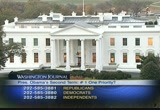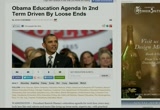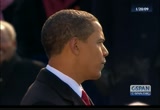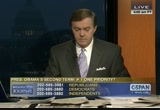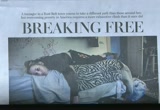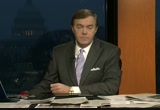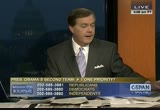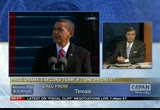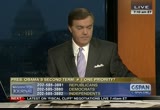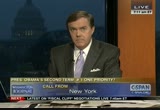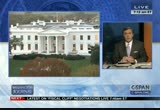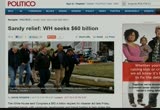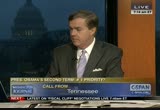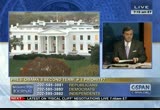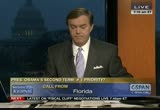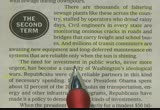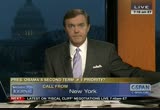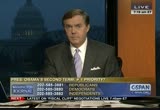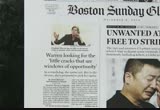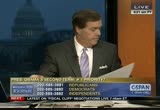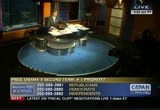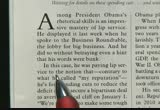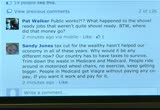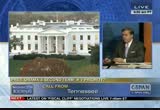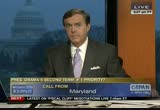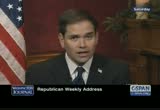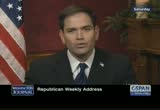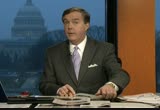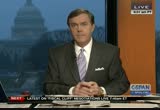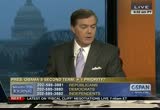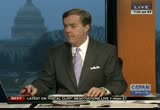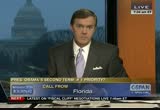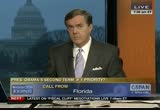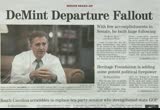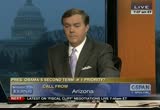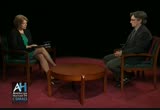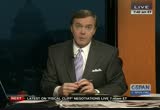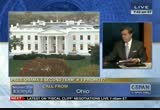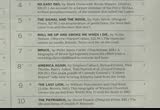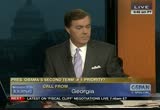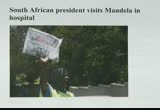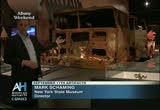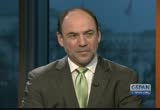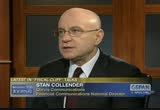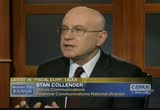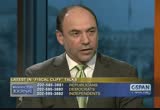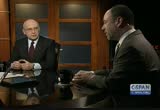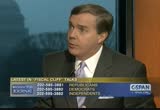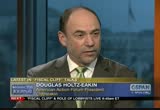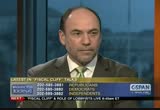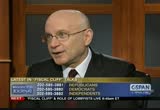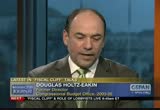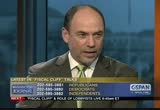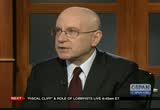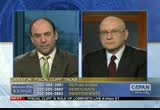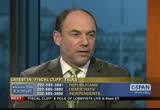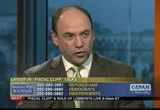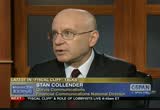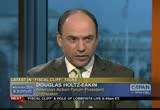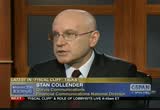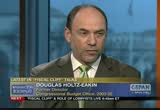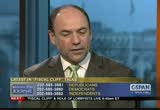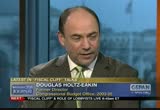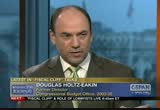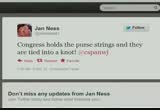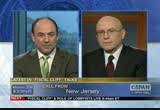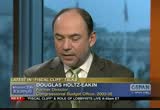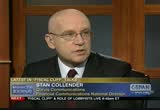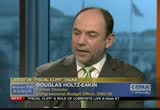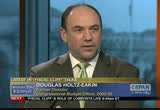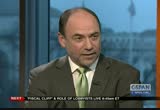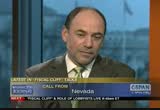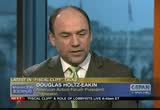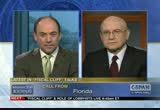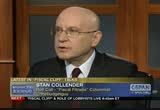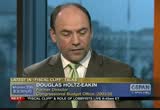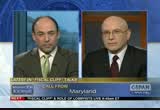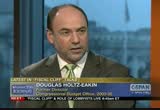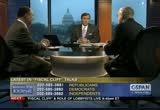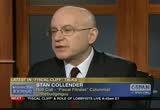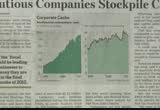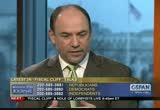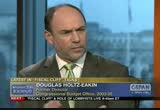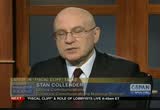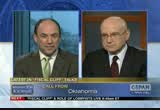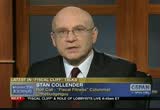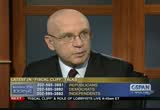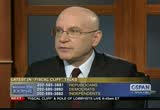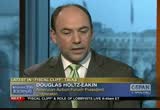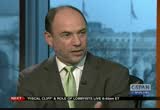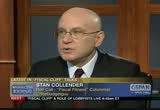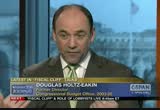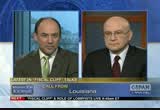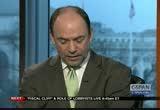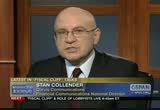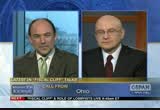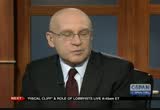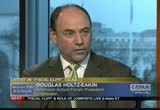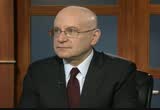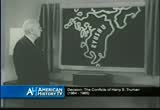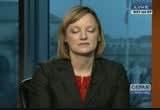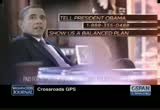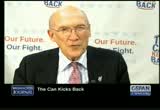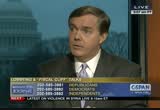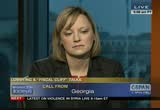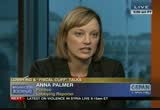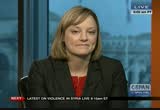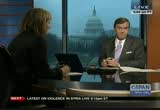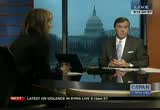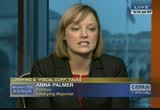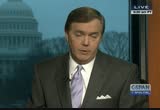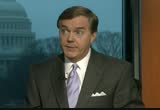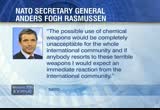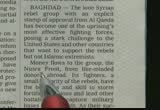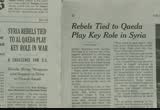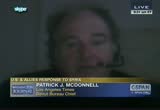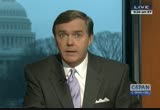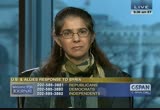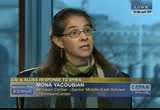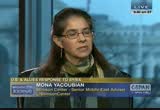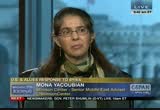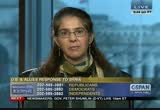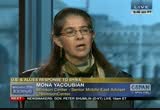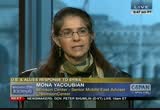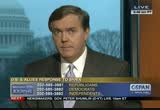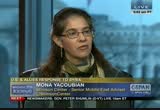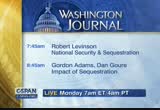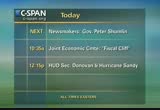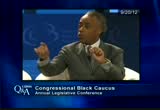tv Washington Journal CSPAN December 9, 2012 7:00am-10:00am EST
7:00 am
and politico reporters on the role of lobbyists in those negotiations. "washington journal" is next. host: good morning. both parties are reportedly still talking on the phone. as the deadline approaches, we are two weeks before christmas. eric cantor leaving open the possibility of of a post session. let's look of the numbers. the fiscal cliff deadline 22 days away. we want to begin with a look ahead at the second term agenda.
7:01 am
7:02 am
7:03 am
let's go back to the inauguration from generic 20, 2009, a few hundred feet from where we are at as he addressed the nation. he will do so again january next year. this is what he said nearly four years ago. [video clip] >> we must dust ourselves off and begin the work of remaking america. [applause] everywhere we look, there is work to be done. the state of our economy calls for action bold and swift. we will react to lay a new foundation for growth. electrical grids that bind us together. we will restore science to its rightful place and raise health
7:04 am
care quality and lower cost. we will harness the sun and the wind to run our factories and will transform our schools and colleges to meet the demands of a new age. all of this we can do. all of this we will do. there are some who question the scale of our ambitions to suggest our system cannot tolerate too many big plans. their memories are short. they have forgotten what this country has already done. what it free men and women can achieve when imagination joins a common purpose. host: his inaugural address from january 2009. the question is, as the president moves to a second term, what is your number one priority? the number one agenda item you
7:05 am
think he needs to address? danny is joining us from west virginia on the democrats' line. caller: good morning. the first issue and the core of all of our problems is the free trade we have been engaging in for the last 20 years. if you look at the jobs numbers and how long it takes to recover from the sessions, the clear issue is our jobs have been exported to low-wage countries. our small towns have been wiped out. we need to end of this. it has benefited the rich. now, they are talking about the european free trade deal. every time they do a free-trade deal it makes the issue worst. we need to fix it, and it will
7:06 am
fix many other problems. host: the focus on small towns. two years and seniors as they prepare for graduation and the problems many face in small-town america. the headline from "to the washington post." we have posted this question on our facebook page. we ask what is the president's number one priority. we have it fell joining us from columbus, ohio on the independent line. caller: i would like to say i am a professor of history and political science. i would not want to be labor anybody with all of the rhetoric
7:07 am
and everything going on now as a look at a superficial level. with the president has to do is keep up with what he has said in his political speeches. he needs to stay strong on that. if he does not, it will impact his entire presidency. people want to turn away and say this will not be difficult. it certainly will be. he needs to stay strong on what he said. other than that, there are so many other issues. what he got elected on this time and what was most present in the populous mind is he needs to stay strong on what he was elected on and what he said he was going to do.
7:08 am
host: this is from the facebook page. the question is, what do you think the president pose a number one priority should be. brian is joining us from texas on the republican line. caller: good morning. i am down here in texas and we voted the other way. the number one thing i see is jobs. you have economic growth, you have money to in the system moving. getting to the people that need it, not the people sitting in washington, d.c. i was just listening to what mr.
7:09 am
obama was hanged and all of the things he promised in 2008, and now with a new election, and demanded, raising taxes and $1.60 trillion in texas. how is that going to help anybody? people do not have the money now. where are we going to get it? coming from the government, everybody thinks that are entitled to something. thank you for the call. the top solution is to break the congressional gridlock. north dakota on the democrats' line. caller: good morning. the number one priority is bringing jobs home from china.
7:10 am
host: you are on the air. go ahead, roger. caller: these people that sold our country out, they need to be exiled to themselves. host: good morning on the independent line. what is the number-one priority as the president embarks on a second term? caller: the issue a want to talk about this morning is one both sides agree with. everybody agrees but the tax code needs to be reformed, simplified. it needs to be changed in a permanent way where businessmen and individuals can plan for the future. there are multiple ways to do this, cut in reductions, giving everybody a fair chance to the tax code. i think it will really chance the economy. put it on a solid basis for
7:11 am
businesses to plan and go into the future with. host: what do you think the president's number one priority should be? caller: first of all, i would like to make an observation. ever since president obama became president, i have noticed watching your program that your daily topics are on what president obama is going to do. i would be a wealthy woman if i -- for the many articles to read on him -- a about him that are very negative in many ways. going into the second term, i noticed he never did that with president bush. it was always a different topic every day. for his first six months he was never talked about.
7:12 am
he was not as competent a person. host: i have been here a long time and i beg to disagree. we have been focused on the same issue with president bush. much of the last month we have focused on congress and the president and the fiscal clef. our decision today was to narrow it to look at what the president needs to do as he embarks on a second term. i welcome your opinion. please fill ahead. caller: he looks into the jobs situation. my number one priority for president obama is to have him look at the jobs situation. host: thank you for the call. a story per chelating last weekend, what is known as a
7:13 am
supplemental spending bill that will move through congress. a $60.4 billion request for disaster aid came in on friday, weighed heavily for community development's to help new york and new jersey recover from hurricane sandy. most of the focus is on the immediate recovery, it includes $13 billion as a downpayment towards longer-term payments to protect against future disaster. the question this morning is, as the president begins on his second term, john is joining us from illinois. caller: i will distract a little bit. i hear so much talk about cutting entitlements. we never hear about over spending government waste.
7:14 am
cutting some of the money that we need a in order to serve our country. why can we ever hear about where money is going that it should not go like research for monkey science. that is my comment. host: thank you for the call. john on the republican line. caller: i just wanted to say i think the number one priority -- the biggest thing we are seeing in the business world, small businesses are not able to borrow money to expand it. no help from the banks whatsoever. we had to go to independent leasing program. i do not understand why president obama is the president everybody thinks he is. why is he not helping with small
7:15 am
business that is so important to the united states? we are getting no help. i would like to see -- he has never been in business, he has never done anything as far as the business world is concerned. his political ideas for business is nonexistent then anybody can see. until we understand that we cannot keep electing lawyers for a government, we will have these problems. these guys have never been in business. they are only into their political agenda. the political agenda needs to end. host: thank you for the call. this from the twitter page. an earlier caller talking about government spending. this from "the washington times."
7:16 am
so far in fiscal year 2013, the government notching up a $172 billion deficit in november a lawn. jams is joining us from orlando, florida on the democrats' line. caller: i think the number one priority is the people, and i think he will do a good job. people should give him more credit and let him do what he is doing. it will take time. i think he has a lot on his hands to deal with now. host: if you get through, turn the volume down on the tv set. this is from "to the new york times."
7:18 am
our question -- what should be the president's number one agenda. next up is christine from new york city on the independent line. caller: good morning. i believe the president will not be able to accomplish his agenda without doing something that i believe is supported by the majority of the american people, that is the critical need for campaign finance reform to restore us to democracy that the people are represented at intergovernment instead of special interests. if we got campaign finance reform enacted, i know john mccain wanted it and a lot of other people -- we could then move on to do what we desperately need to do, which is begin to address the climate crisis.
7:19 am
it is all over the world. venice, italy is flooded. a tornado in italy the other day. japan just had another tsunami. the disaster of sewage and leaks. the climate apex for a meeting was just a in dubai. they came to the conclusion that climate change is over use of fossil fuels and natural gas and oil. the amount of fossil fuels utilize by countries with huge populations such as india and china. we need energy, but we need to move onto clean energy. that is one of the president's priorities. he can create a whole new infrastructure that replaces the military industrial that
7:20 am
7:21 am
-- our question for you is, what the think the president's no. 1 priority should be? just is joining us on the democrat line. caller: good morning. it was a little bit of serendipity that you read the editorial from "the new york times." i believe the first priority, our entire government should be repairing the infrastructure of the country. we have some infrastructure from the 19th century. with what just happened in new york, i really do think that our
7:22 am
treasure and our people -- repairing the infrastructure will create jobs. we also have to begin protecting our coastal communities from the mega storms. even if we just decided right now to work against climate change or to slow down climate change, it still is going to happen. it will happen. it is a mechanism that is not going to stop even if we were to stop pumping co2 into the atmosphere. we have to prepare and work to that. that is jobs. that is building the hoover dam or building the interstate highway system. it has to be done. the money has to be spent or we will all be in a really big trouble.
7:23 am
7:24 am
a couple of comments from the facebook page. here is what some of you are saying. the question is, what should be the president's number one priority. from the republican line, good morning. caller: jobs are the most important thing, and the president has made it hard for small business to borrow money from a bank.
7:25 am
i do not know why the bank examiners have clamped down on small business so hard. they keep saying, small business is the backbone of america. do something to help us. that is the biggest thing. we need to create new jobs. that is the main priority of what the president ought to be as jobs. the people of the unemployment line and get them back to work. we need money to expand. as the big reason banks need to relax rules and regulations and a small businesses expand and create jobs. thank you. host: another comment from joe who says -- from "the new york times."
7:26 am
7:27 am
the independent line. caller: my question is, how money -- i think we need to go back to the basic for all americans to understand how money is made. how is it created. it is a clear understanding, that is the point. what organized people to come together to do something like school, police department, all of these types of things. how is it created? what is day one? as what i am looking at, what is day one? when civilization first expands,
7:28 am
how money was created? host: the republican address came from marco rubio who has had a higher profile the last couple of months including his acceptance of the camp award in washington. here is more from the florida senator in the republican response. [video clip] >> americans of struggling to keep middle-class jobs for two reasons. we're not creating enough of these jobs and too many people did not have the skills for the jobs that are being created. a limited government can and help solve these challenges. we must get the national debt under control. tax increases will not solve the $16 trillion debt. only reform of the entitlement programs will help control the debt. we must reform the tax code by getting rid of unjustified loopholes.
7:29 am
the goal should be to justify new tax payers, not new taxes. regulations are needed, but they cost money to follow. the more expensive regulation is, the less money a business has to give raises or hire new people. we must not let innovation go to waste. we have the potential for all kinds of middle-class jobs from the fields and platforms where we draw to the manufacturing plants that will return to the united states with lower-cost of energy. we need americans to encourage these opportunities, not continue to block them. by making the future value of a dollar more predictable. we must put the cost of health insurance under control. you should be able to get a health control -- a health-care plan with the same tax benefit if you buy it for yourself or if
7:30 am
an employer buys it for you. host: the analysis of david hocking. our question is, what do you think the president impose a number one priority should be a dangerous account term. this is from our twitter page. next is austin from illinois on the republican line. caller: i think it marker rubio is correct in his statement on just trying to get it going.
7:31 am
here is my plan. my plan is to get health care -- the health-care committee to make sure businesses are not ripping off people. i do not think the answer is to just give people health care. not just to signify giving health care away but actually have people are at. host: we will go to pam and joining us from idaho. caller: i would like to respond to the congressional gridlock. i think what obama needs to do is to keep his campaign machine active it for the 2014 elections to get rid of the tea party arm and to eliminate mitch mcconnell. if everybody would pay attention and watch c-span it would realize who is causing a lot of this problem.
7:32 am
we are down with our revenues to the lowest we have been in 60 years. they have stopped revenue from coming and that. we need revenue. there are a lot of people who do not mind being taxed. i do not like being taxed, but i have paid taxes my whole life. if we could get rid of the tea party arm and mitch mcconnell, we would be a lot better off. host: 21 for the call. if you are just joining us or listening on c-span radio, our focus is on the president's second term, what should his number one priority be? a follow up on one of the final choruses in the house of representatives yet to be determined.
7:33 am
a run up election that took place yesterday. according to the associated press with 98% of precincts reporting, he led landry by 61% to 39.2%, a difference of just over 21,000 votes. that is from the third congressional district. from the venice, florida. caller: hello. first of all, the first thing would go to the jobs. it is better to let the federal go and let the majority go. look at north carolina.
7:34 am
it would be through the revenue department. first of all, he is kidding himself. the money will not be collected because taxing the rich is not that easy. they move the money to capital gains are offshore whatever. it will mean less jobs. some jobs will be cut or there will not expand it. why would you go for that? if you spend $80, the next step from medicare and whatever. i am not saying cut the defense, obviously a republican
7:35 am
rayon. if you reform does things, especially the entitlements, what is the expense? how are you going to pay? $200. if it goes through the program. cut the prices on the services. you have absolutely no idea how much it costs. if i go to brooklyn, it will be cheaper. they know how much to charge. in order to create the jobs, you have to go to amend it.
7:36 am
host: to write for the call. a lot of people want to wait and it. the number-one priority item, this is from a viewer who says it should be to back fiscal for timber living tax cuts expire, close loopholes, and cut spending across the board. a surprise announcement of senator jim demint who will be leaving the senate after nearly two terms. this is from friday politico.
7:37 am
just as on the conference but still, arizona on the independent line. i wanted to call and regarding obama's priorities. i think it should be related to pregnancy. there are too many children being bored. too many do not have the resources. host: ok. we will leave it there. robert is on the phone. caller: the blacks and mexicans
7:38 am
stick together and vote as a block. as a minority party, the blacks and mexicans to vote as a block. host: from our twitter page. the outlook section of "the washington post." a look at their styles and approaches to the job. also, a piece on hillary clinton. president truman's oldest grandson, who was the first truman to travel to japan. tonight on c-span 3, a look at hiroshima.
7:39 am
a talk with his trip and what he learned it. learned through his words teacher made that his grandfather went through and now he went through in hiroshige of. 6:00 for those on the west coast on c-span 3. here is a preview. [video clip] >> i tried to look down and i saw so many dead bodies floating on the surface.
7:40 am
people --'s so many the people suffered from the burned bodies. they went into water. it jumped into the river. >> that was a survivor of the bombings in hiroshima telling her story for the first time to daniel on his first visit to the two cities where the bomb was dropped the in 1945. you are listening for the first time. what did you see your role as as you were listening to it? >> just to be there to listen to her and to let her speak and to let her do this for the first time. >> for her understanding she was talking to the grandson of the man who made a decision to drop the bomb. did she talk to you about that? >> she did not.
7:41 am
a lot the came to speak to us understood -- for her it was the first time. she spoke for the first time because it was me and my family. she thought it was time. a lot of the survivors speak out. those who do tell their stories as a means of education and as a means of reminding coming generations of the horrors of nuclear war so we do not repeat it. for her until this instance, i think it was because this was a different opportunity. that was the catalyst for her coming for the first time. host: the words of clifton truman and daniel. arriving at enter hiroshima.
7:42 am
-- arriving at in hiroshima. the decision by his grandfather. we will have more with the conversation tonight at 9:00 eastern time along the with a video from hiroshima, what he learned and what he saw. that is tonight on c-span 3. back to your calls and comments about what the president's party should be in the third -- the president's priority should be in the second term. peter is on the phone from alaska. caller: good morning. i think the priority should be rejected like the guy said back there, he ought to pray. he up to ask god. it got will talk to him.
7:43 am
he has answers to all of our problems host: call from cambridge, ohio. caller: i would have to say the number one priority should be to cut the super bloated defense budget. nobody is talking about cutting the defense budget. along with that, we should vigorously prosecute and investigate the reasons why the wars of tourists are going on. all the other worst been going on my whole lifetime since the early 70's. host: joseph has this on the twitter page --
7:44 am
from the new york times. no. 2 is killing the kennedy by bill are rarely. no. 4 is "no easy day," by mark owen. from atlanta, good morning to you. caller: i want to say this. the republican party keeps saying the president met all of these promises. any president a comes into office says what he wants to be for the country. when you have the house and
7:45 am
congress and everybody purposely has their mind in the civil war days, everything you try to do, they are against the because of their minds, where their minds be. just like when the president was trying to get to rise, she has and permission from the fbi. they say she should have investigated the fbi. how will she looked at investigating the fbi? they look at silly stuff and people are supposed to believe it. instead of john boehner, his name is b-o-e-h-n-e-r-- pronounced it right. >> his name is john boehner. it is how we pronounced it. some news from overseas, this is
7:46 am
from the bbc. hugo chavez and need of cancer surgery. he only returned to cuba on friday. tests had detected more cancerous cells. there is this from the associated press. the south african president visited nelson mandela who is a in the president. -- who is a dental the hospital. he was admitted to a military hospital. he found the frail 94-year-old to be comfortable and in good care. we will turn our attention to the issue that has dominated our discussion since the election. we will continue to do so over the next few weeks.
7:47 am
the president reject talks continue on the phone on the fiscal cliffs. what is happening behind the scenes? as next. we will have our sunday round table. all weekend long on but tv and american history to be, we are featuring the literary life of albany, new york, the capital of the new york state. we will feature all of the history programming our producers gathered there. here is a portion on september 11 exhibit found at the new york state museum. [video clip] >> we are at the new york state museum. this is our gallery dedicated to the history of september 11 and
7:48 am
the attacks at the world trade center. the largest collection of material amassed after the attacks of september 11. to tell the story for the first moments of the attacks using objects and photographs from the world trade center site. this is a piece of steel from the south tower. we put it in a place or the public can come and touch it. a real tangible experience. you can see the windows and in the steel. this would have been the outside of the building. when we designed the gallery, we very purposely put a major artifact to confronted the visitor. that was not something frightening or twisted. we thought a powerful piece of steel would be the first thing people would see to start to
7:49 am
began the world trade center and the attacks. 100 rescue vehicles were destroyed a in the attacks. we were looking at the vehicles, we researched them and decided to collect this complete vehicle. this is engine 6 dedicated to emergencies at the tower. this was one of the first responders. it pulled up next to the north tower where the hook up and started pumping water up into the system's in the north tower. the south tower was hit. the south tower fell. at that time the five men inside the tower began to evacuate. four of the men were killed and one lived. host: be sure to check out but
7:50 am
tv and american history on c- span 3. a look at the museum of the 9/11 exhibit. you can check it all out. also on our website at any time on c-span.org. our topic once again, the fiscal cliff. joining us here is stan collender and douglas holtz- eaken. what is happening? what are the two talking about. guest: the nature of the tax increases, how much, and on the other side, what kind of entitlement reforms as the president willing to offer? that has been going back and forth for quite awhile now. there are talking about the same basic issues. host: one of the shore signs of
7:51 am
action in washington, we have heard there is a possibility that they could come back after christmas. guest: i have been telling clients since september we were going over the cliff. i was not sure there was a sign it or coming back before christmas. this last-minute deal of some time, it could easily be approved -- the house and senate do not need to be here for this because it will not be the big, big deal. this is not the grand compromise they are talking about here there is not enough support to do the technical things. this could be a simple package they do at the last minute. host: even if the white house and john boehner agree to a deal, congress may not pass it. guest: that is my biggest concern.
7:52 am
it is possible the speaker and the president could reach a deal, there is a significant portion of the republican party that would rather go over the fiscal cliff and have a deal. host: this is a very important change. a lot of people say, 1995 and 1996, the speaker and president clinton were able to cut a deal addicted to their caucuses what will happen. this is a different deal. he could say, if you do not like the steel, it is not clear to me if john boehner wanted the cops as they would take him up on the offer. guest: the parties are much more partisan and split. the ideological differences between them are much greater. the speaker is a little weaker than gingrich was before. the world has changed completely since 1995. guest: i would point out all the
7:53 am
focus is on the house. how are you going to get it through the senate? mitch mcconnell is in a tough position. harry reid, he has some people who loves his job. he would like to be along with the progressives. i look at this and i worry because in the camp that believes going over the cliff -- the united states will enter a new recession. i do not see the basic associations on the house and senate side that would write the legislation and pass it. host: so far the markets of not reacted. does that hurt the pressure of a congress often feels? guest: no doubt about it.
7:54 am
yes, i agree with it, this could be terrible economic consequences, but it is not immediate. we talked about a fiscal slope now. host: i have thought a lot about this. we have seen what happens again to of these circumstances. there was a very sharp drop of confidence with economic consequences. if you look at the data that came out earlier this week, november, december, consumer confidence plunges. markets are expecting things to get done. oppressing a denture a deal. leadership is an able to comfort a deal, we will see market volatility. you cannot go back. i worry a lot about it as well. guest: 9 have the market's not reacted as negatively as with of the wood.
7:55 am
they are expecting a deal and pressing that in. it is likely to be a big drug generate second and third. i think that will come back. a lot of members of congress need to vote against this once so they can vote for it. they need to go to the constituents and said, i voted against it, but he saw what was happening. your pension funds were getting hurt. we had to do something. host: we have been talking about the fiscal clef. exactly what is it? the bush tax cuts will expire. the 95 apparel said to expire. the new affordable care act taxes will kick in at $18 billion. spending cuts, we have been talking about it. the budget control act will
7:56 am
expire at a cost of $26 billion. the medicare payments will be eliminated at $11 billion. we heard last week it is not a cliff. guest: i understand that argument. we're not going to pay off $395 billion of taxes on january 1. instead, those things will take place over time. you might even delay their implementation. that is all true. it relies on the fact that households and businesses are myopic. they see as far as their toes and no further. if you do not have a deal, your taxes are going to go up. a lot of americans to not know a lot about the fiscal cliff. the confidence and a market reaction is very different than the spending cuts and tax
7:57 am
increases. here is the fundamental point. i could be wrong, it happened once. why find out? it is irresponsible to govern the country this way. the sequester and across the board cut, it is bat policy. everybody knows it is bad policy. we are very close to doing it. i find the whole situation unsatisfying. host: our phone lines are open and you can also send us an e- mail. you work for a number of members of the democratic party. you work for the president. a question that comes up often is why there is a partisan divide. what has changed over the last 20 or 30 years? guest: we only have an hour so we cannot go through all of
7:58 am
that. there are a lot of things. there are some extraordinary changes. politics as a con tact sport is a substantial change from when i worked on the hill. they did not agree on anything, but they enjoy each other's company. i have seen with my own eyes republicans and democrats refuse to get on the same elevator these days. as to how juvenile it has become. the parties are not as strong. there is a lot of independents relative to leadership. things are not the same. host: what have you seen over the past two decades? guest: i think the quality of
7:59 am
the staff level helps. i think that is the biggest difference between 89-90 when i was at the white house for the first time and 2000. there are less opportunities for those skills now. without the reservoir of expertise, you see members making mistakes, locking themselves into position and moving too quickly. hyper partisanship israel. we know that. the enormous number of people are not affected by their votes. there will get reelected. the third, and i think the most important, there was a time -- the names that come to mind are robert reagan and clinton. this is what america needs. i have been elected by the americans, i am sending you legislation to enact this. that did something wonderful for
8:00 am
congress. the cassette, i did not want to do this but the president asked so we are working on this. they could say, this bill was not perfect, but we fixed it. that gave congress cover to get things done that we have done seen since 2000. you need a president to be able to go to his side and say i know you don't like this but we will take care of this another way and the other side can say what is important to them. we need that kind of leadership. host: this is a photograph in "the wall street journal." go back to your earlier point. bread -- there is a division between the president and the white house but also house and senate republicans. senate -- senator mitch
8:01 am
mcconnell did not endorse john boehner's plan last week. guest: in this case, you've got substantial differences in party outlook. the tea party was always stronger in the house. what will work for senator mcconnell was running for reelection now may not work for house republicans. even if there is an agreement between speaker boehner and president obama, it is not clear it will be acceptable. host: david is on the phone from york, pennsylvania, republican line, good morning. caller: i'm calling from arkansas, actually. i am an attorney and i've tried to watch the actions of this president. i take into consideration the books he read and he uses the
8:02 am
philosophers who taught him as he grew up. i really believe that based on the way he is trying -- that based on the way he has been trained, i think the president wants to go over the cliff because that will achieve the things he was buried he wants to break up the republican party. he wants to break its back and then he also wants to go over the cliff because he wants to have a financial crisis because if you look at the study, that is the only way he can really achieve the type of social and fiscal non-responsibility he wants to achieve. that is break the back of the economy and then we have a crisis.
8:03 am
and then he will come in and fix it. it is a very socialist way that will be unacceptable to most americans accept the slivers of the american public, the african americans, the people he got votes from, the leftists, the universities, and the people who love obama. guest: if you look at the situation and you take it from my point of view, they don't want to go over the fiscal cliff. no president wants two consecutive terms of recession. that would be a terrible way to implement your agenda. is it really a danger to go over the cliff economically? tim geithner said they are prepared to do that and i found that shocking. i think it is a danger that could be just politics.
8:04 am
what are the consequences of going over the cliff? and the next question is -- are you trying to get a big deal in this situation? we have an enormous debt problem that is well recognized. we will have to have substantial changes and we don't have the option of not doing it but we could do it in the spring as opposed to december of this year. how much of that break problem do you import into this setting? maybe they can get a small deal and get past the cliff and we will be back to this in 2013 and that will be the place where we see him trying to implement his agenda, not here. guest: i work for a think tank interested in domestic and foreign policy issues. host: how is k street dealing
8:05 am
with the fiscal cliff and what does that mean for your business? my guest: clients are more wall street. the uncertainty on wall street about what is going on here is astounding. the lack of understanding is ready a astounding. you will see many surprises and surprised people on wall street. i have been telling them since september that i thought we had a better than 50% chance of going over the cliff and they were shocked and and they are shocked now. host: what is that look like now? guest: is about. at some point this -- is about 60/40/ this is from david
8:06 am
humphrey -- guest: he ineffective did something very close to that. he put out a counter offer which was $800 billion in revenue raised on wealthy americans, an additional $600 billion in health program reforms, $300 billion in discretionary cuts, total deficit reduction of $2.20 trillion and it was a carbon copy of a proposal that erskine bowles made to the super committee. the frustration of the republican side has been that the president started with the proposal and said i want $1.20 trillion dollars in taxes and i want to get that deficit reduction. that means that as net spending of zero and it is stuck there.
8:07 am
there has been nothing about a counteroffer that would allow negotiations to continue. to have the president missing in action on the senate side is a problem. guest: first of all, the bulls simpson plan failed. it did not get the required votes. the people who voted against it, the chairman of the ways and means committee and paul ryan, chairman of the budget committee, and jeff hensarling are still debating. there was not a and of support within the caucus. the amount of revenue is far in excess as to what can -- compared to what the speaker is offering. bowels-simpson was not acceptable than and it will not be acceptable now guest: it got
8:08 am
60% of the votes. it did not get the supermajority but it got a lot of republican and democratic support. the political construct was successful. it is not tax increases that are the key. it is in exchange for what. if you take that on, you have a different location -- equations. guest: how can you miss alan simpson? [video clip] ♪ >>
8:09 am
stop getting on youtube and watching gangnam style and go sign people up on this baby. take part or get taken apart. or these folks will take apart the treasury before you get there. ♪ ♪ ♪ host: that has gone virus. he refers to the old coots will spend the money. those are his words. guest: i really cannot stand that video. he just raised the stakes
8:10 am
enormously. he is right, though. one of the most important about this issue is that people who are at risk are the kids. they are the next generation who will carry an enormous amount of debt and may inherit an economy that will not given a good standard of living. we are leaving behind a fundamental broken promise. we do not leave a country that is strong and prosperous as we inherited. guest: we need to distinguish between the longer-term issue about reducing the deficit and the debt and the current issue is the fiscal cliff. that would be the worst fiscal policy put in place since the great depression when we put an austerity policy in place to send and through the country back into recession. the idea that we have got into a debate as to how to reduce the
8:11 am
deficit is wrong. we say don't reduce the deficit now this fast. that is what the fiscal cliff is all about and that's why ben bernanke cannot put the phrase. guest: as exactly right, we have two very different problems. the only reason we're talking about the second issue is politics. this is the politics of the moment tromping economic common sense which is a dangerous combination. guest: the fiscal solution is a fig leaf to allow members of congress to say we're going to spend so the spending cuts and tax increases and let the deficit be $500 billion higher. host: the debt is at $16.30
8:12 am
trillion and has increased $4 trillion over the last four years. the present and congress will say that over the next 10 years, we will get it back to where was in 2009, correct? guest: that is fundamentally not good enough. countries with our level of indebtedness grow more slowly and they have a higher chance of some sort of fiscal crisis. we should not mess with either one of those things. i would like to see an aggressive reform of the spending programs. let's not get back to where it was but start going down. that does not have to be austerity. imagine fixing social security. right now, it is sullivan because we promised in under two -- it is solvent because we promised and under two decades to keep it under control.
8:13 am
we should fix social security so it stands on its own and not cut people's benefits and that would not affect anything for the next 10 years. that is not austerity. we send a signal to the people of loaned us money that we're getting our fiscal house in order. host: this is from twitter -- richard is joining us on the republican line from new jersey -- caller: thanks for taking my phone call. i think bobby jindal had it right. anybody who is really a financial conservative or a radical tea party #-- member knows that the numbers do not add up.
8:14 am
i know that i will be paying a larger amount of money next year. it does not go to my staff or lowering prices or purchasing equipment. it is up to a bloated bureaucracy. it affects future growth. $1 trillion over tenure sounds like a big no. but that is $100 billion per year but that does not make a dent. we have children and we know what the future will bring. i would like to have an honest discussion about the numbers. guest: richard is from new jersey with a self processed -- self professed conservative republican governor. for every dollar we spend, the
8:15 am
deficit will go up. the numbers will get worse. in terms of the fiscal crisis, he mentioned that would be evident with interest rates. guest: you probably will see it in the equity markets first. guest: i don't think it will happen in december. if you go over the cliff we will see strong reactions in of we don't control the debt, the leading edge of this will be the international ratings will be downgraded for the u.s. we have had one mark down so far. the problem is politics. they are -- it is too broken to address the problem. if we go through the honeymoon period of a new congress and we don't do something substantial, they will say these politicians
8:16 am
are too broken to take on these problems. they could give us a substantial downgrade. guest: it is not clear what the right answer is for them. going over the cliff would demonstrate that congress did not blank when they needed to make a substantial reduction in the deficit. would they say not going over the fiscal cliff is a good sign? you should prevent the economic downturn but put in a framework for better growth. when the s&p downgraded last year, -- we are still the most
8:17 am
creditworthy countries. guest: we are continuing to look like the best looking worse than the glue factory. --horse in the glue factory. everyone says we are the best and we are fine but all sorts of countries get in trouble. this should not make people feel good about where we are. research success -- suggest we are in the zone where the risk is higher. i would prefer not to find out. the ratingsot sure agencies are the ones which be taking our cur from, i don't know what their credibility is guest: i think their credibility remains open.
8:18 am
i have credibility in rating government debt. i worry about them but the most important thing is if we got a substantial down grade, u.s. treasurys would no longer satisfy international banking requirements. this spills over to the way we will run our lives. this is something we should do anyway. guest: when we got downgraded last time, we were told that pension funds would have to dump the securities and they did not.
8:19 am
host: guest: john boehner put out a package which was balanced in the sense the president has called for and included a tax increase the president wanted on high-income americans and had substantial spending cuts. why cannot the president do the same thing? guest: those cuts were specified in general terms only. guest: i would love for the president to come in as the general. host: democrats line, good morning. caller: our you doing today? i will be real quick -- this is
8:20 am
a joke. every time i see this mr. aikens on tv, i laughed. this guy was with the regime that put us in this mess today. here is talking about social security that has never headed a single penny to the national debt in 78 years. when they talk about social security, they are talking about cuts. we will take money away from granma? this is a joke. the republicans got us in this mess and the republicans are preventing us from getting out of this mess. by a filibuster in 386 tons. we have not had that many in the history of our country. it is the republican party that that is in this mess and the republican party who are preventing us from getting out of this mess. guest: not a fan --
8:21 am
on social security, the problem with the is we are promising cuts right now. that is what law says must happen unless we reform it. i think that is a terrible way to run a public pension program. it should have reforms. the last such reforms that have been suggested, i would be happy with any of them. there is a set of leaders and social security that is not complicated that can be done and should be done. that would be the best thing for social security. host: thank you for being on c-
8:22 am
span. palm beach, fla., in the and the blind -- -- on the independent line -- caller: as an independent, i am starting to form an opinion that if president obama wants to go over the fiscal cliff, it appears that way, because he has had no credible counteroffer. he says i will give you cuts in the future but he is not specific. his speeches are always peppered with we have to invest. he does not mean in the private sector. he wants more the firefighters, teachers, policemen. this adds to the public debt. we are borrowing, from what i read yesterday, 46 cents on every dollar. that appears to me to be untenable.
8:23 am
i am no fan of john boehner but he makes an offer that got him in touch with the rest of the republicans, by the way, because they said he was capitulating but now, obama comes back with it is not good enough. host: let me go back to the "washington times"store rate -- guest: in the current environment that is the correct policy. component ofone gdp growth providing growth and that is the federal government. in the current environment, you don't want to reduce that substantially. host: when do you bend that curve? guest: i think we are past passing stimulus bill. we have been growing officially since june of 2009. more past the need for fiscal policy.
8:24 am
we need better economic growth policies. when the things that provide incentives for business investment and hiring. if you look around the globe of the countries who would have had our problem of big debt and low growth, the most subtle ones are where you keep taxes lower to provide growth like canada. they raised more revenue but they put in play a much more business-friendly tax system. on the spending side, you need to control spending to get the debt under control but not all spending is created equally. you want to preserve core functions of government like national security and education and you want to rein in the entitlement programs. action reform an entitlement reform -- we are not fixing entitlements, cutting core government functions.
8:25 am
host: we have been john on the phone on the republican line from maryland. caller: good morning. anybody talking about the real problem that we have in the united states. you cannot go into a store in the united states and buy american products. if you don't put the people to work, you cannot pay taxes. in jail forn murdering 15 or 20 people and we feed and clothe them all year. i don't understand it. host: thank you for the call.
8:26 am
take a look of the budget and draw a say eie. where does the money go? guest: most of the money are the things that have put in place where you get benefits regardless, social security, medicare, and medicaid. national security and basic spending on the fans an annual preparations for education, health, and the upper structure are a small fraction. we are seeing the baby boomers retire and we have seen health care spending rise. that combination is very powerful on the federal budget. that is the biggest difference between the late 1990's and now. i love to be about to go back to the late 1990's.
8:27 am
to do that, you would have to have another dot com bubble with an enormous amount of revenue. you have to have the baby boomers 15 years away from retiring and i don't have the luxury of the soviet union falling. the recipes that worked in the late 1990's worked. they don't work now. we have a different set of problems. host: from new york city, democrat blind, go ahead. caller: thank you for taking my call. even if we go over the fiscal cliff, we need a bigger plan because it does not even balance the budget. i don't think we really have a supply-side problem. they talk about cutting taxes on the right and i think there are so many people out of work and i think you need to get these
8:28 am
people to work. i just think we have a demand issue, not a supply issue. if you're out of work, you cannot pay taxes. guest: he is exactly right -- no one is talking about a fiscal cliff that will solve the problem. there is no grand bargain being discussed except in the most general outline terms. there is enough to be -- nothing close to being politically acceptable. we're only talking of something of that will allow people to get through this. in the short term, we need to have fiscal policy that may get the deficit higher than what it would be. ben bernanke was saying the deficit could be cut too far and too fast at the same time. this has to be the time where we
8:29 am
don't go into an austerity program. we are not quite there. if businesses are spending and consumers are spending and trade was helping, i would say that is the right time to be doing this. the deficit reduction has to be done in context. host: this is from "the wall street journal"last week -- guest: they are not spending because they are angry at washington but they don't have the demand for their goods and services. that is the way it is now. have a great incentive to do anything. we're spending this money on the wrong things. the president proposed additional stimulus of measures including infrastructure.
8:30 am
thenot sure you can rely on private sector to kick in that quickly. host: guest: on the issue of growth -- this is a fundamental issue. the only disagreement is how you get to it. my concern about the fiscal cliff is it will hurt book -- growth and we will get a recession you can never fix your debt problems and a recession. businesses and their investments are its traditional kick starter to recoveries. the government doesn't necessarily have to solve this. right now, business confidence is low and falling.
8:31 am
business investment has been negative. you need to fix that and part of fixing that is having a credible economic policy that is not something that turns on and turns of which it has been doing for years. someone should say this is the tax system, go. there is a fix on the entitlement system. a reading that changes is a region results of an extra tax for businesses. there is an enormous amount about the business environment you can improve now with a stereo -- not with austerity but sensible programs. we have this 100-year old notion that the congress raised
8:32 am
the debt ceiling. it is the belief by many conservatives that the price of doing that -- and you have to do it -- you cannot not raise the debt ceiling -- and that should be an attempt to take on future debt we saw in 2011 the politics were miserable. i would prefer to keep the debt ceiling as far away from the fiscal cliff discussion as possible. if you intermingled them, we lose. guest: the debt ceiling is one of the most ridiculous policies we have. you can vote to spend more money and tax less and in the fact you are also voted to increase the amount the government borrows and you can refuse to raise the debt ceiling. we should be eliminating the debt ceiling. you automatically vote to raise the desolate when you vote to spend money. the idea that we have to go through this whole thing in
8:33 am
february again is ridiculous. host: oklahoma, independent line, good morning. caller: this republican party is a joke. they have done nothing to work with this president. they are a bunch of southern republicans. they cannot handle a black man telling them from a leadership position. they take an allegiance to grover norquist. give me a break. the allegiance should go to the united states of america were host: is your solution? caller: i would get rid of all of them, that's what i would do, thank you. host: will leave the bear. -- we will leave it there. caller: i have two questions. everybody keeps referring to social security as an entitlement. i paid into that, it is not an
8:34 am
entitlement, it is mine. i have not heard any comments about all the people who pay absolutely no taxes at all. i will hang up. thank you. guest: social security qualifies as an entitlement in the sense that is not an annual appropriation. this is a technical term in washington that you get back much more than you put in and you qualify for it because of certain checklists we created wendell: was put together. in that sense, it is an entitlement, not different in medicare. host: here's a quick comment from one of our viewers -- guest: they are unwilling to pull the trigger and make the investments. you can say the problem is conference but we cannot read every business executives mind.
8:35 am
we do know that since june of 2009, we have been running the same playbook in a miserable growth and i think it is time to take a step back and think hard about the kind of policies we are undertaking. host: i want to respond to this earlier -- you use the phrase uncertainty, that business does not know what will happen. guest: i have asked business folks that if i could give you one after% certainty -- that if i could give you 100% certainty, would this affect you and they said that is not what i want. guest: response certainty and then there is bad policy. ofhave an enormous amount not growing. there can be fairness and social objectives. in an environment where we have
8:36 am
a terrible economic growth, 23 million americans out of work and some of given up entirely, we always would favor rapid growth. host: guest: some do, not sure i agree with that. businesses can be mad at washington all they want. if they see profits in the future, businesses will start to spend and they are not sure about a lot of what will be happening. the election is over and we will have to get past that. host: from richmond, va., democrats line. caller: we have had low taxes over last 10 years.
8:37 am
is there any proof that says that low taxes are improving job growth? guest: let's be very clear -- there is more economic growth than just taxes. the quality of the tax code matters enormously. one thing i thought was promising about the run up to the elections everyone who ran for president said they wanted to do tax reform. the leaders of the key committees and the house and the senate said we would benefit enormously from comprehensive tax reform. i would like to see that happen and that is not about cutting taxes. speaker john boehner is saying $800 billion in more taxes.
8:38 am
the route to higher revenue in the united states comes through tax reform. host: 1 not have a two-year budget? why go through this every 12 months? just guest: give me a budget. we don't even have one. guest: there are legitimate arguments that we should set course for two years and spent one of those years doing oversight of programs to make sure they are working the way they should be. i have some stability for that but the reality is we will not leave it totally alone over two years. the most important thing to be with to have a budget and a plan. host: is that so difficult? guest: cause we don't have anything that the house and the senate and the present have to agree on in terms of budget. the president presents a budget and congress may or may not pay attention to and the house passes a budget resolution, they are supposed to get together and
8:39 am
agree on a but they don't have to. there's nothing that forces those three entities to operate on the same budget plan. guest: voters don't respond if there is no budget. the country has been going along without a budget. this means we would be operating with emergency supplemental programs. we don't have the ability to predict a couple of hours in advance much less two years from now. host: will go next to a republican line, good morning. caller: why don't we have a budget? they don't bother to come up with a budget. guest: i view this as a troubling development. we talk about what has changed in washington congress needs to
8:40 am
do the basics. it should pass a budget, it should pass appropriations bill, we have not done that this year. we're operating under a continuing resolution. if they did those things i regular basis, while the benefits is that politicians would find out where they agree on things. one of the touch points between the two parties and the members is what they learn about. when you get to a point where something big is on the table, there with the groundwork laid to get those kind of deals done and we're not doing that now when i think it is hurting the process. host: democrats line and we're looking at the fiscal cliff, go ahead. caller: good morning. i want to know why we keep talking about social security and medicare? why are we not talking about ssi
8:41 am
and medicaid? that is where the problem really lies because they have not paid into the program. social security and medicare. if we want to fix the situation, we need to cut to that plus all these charitable contributions. we've got people spending money for christmas so why are we not able to have money in the economy? guest: on the medicare aside -- this is a very important issue were one needs a lot of public a lot -- a lot of public education about the numbers and the reality. the gap between peril taxes paid in and premiums paid into medicare and spending going out his $3 billion per year. that program is a big part of the problem. it is also true of medicaid and
8:42 am
ssi, i think they should all be looked at carefully we have sold this section to the american public that they pay a dime into a program, they deserve all the benefits. the gap between what you pay into medicare and when you get out is hundreds of thousands of dollars. it will be nice if you could run a country that way and it works but it doesn't we will have to get back to the arithmetic and realize that medicare and medicaid have these big fiscal gaps and we need to think about how we can run them. host: guest: good question, we don't need a budget which is not required by the constitution. unlike your home budget, the budget of the united states is an internal working document. actual spending occurs under
8:43 am
appropriations bills which are supposed to be passed each year and mandatory spending on things like cells security, medicare, and interest on the debt where we made that commitment years ago and they continue until the president and congress changed them. the budget is a measuring stick. we have not had one for a bunch of years on the country has not gone to hell in a handbasket. the budget resolutions we're not talking about were first required by the congressional budget act of 1974. for almost 200 years, there was no actual requirement that the government have a budget and we did fine. host:stan collender is a graduate of and why you and uc- berkeley.
8:44 am
and douglas holtz-eakin. i will go to the next caller who is joining us from ohio, on the independent line. . caller: good morning. do -- what are we paying congressman and senators salaries -- they are making a lot anyway this, they pay less taxes than i do -- why don't we just stop their salary and benefits until we get on -- until they get on the ball and take care of this situation before the end of the year? guest: i am a fan of this and i have written that unless they
8:45 am
pass a budget, they should not get paid. this is their job and they are not doing it. allowt understand why we failure of the most basic sort to be rewarded. guest: because they got reelected and their constituents voted for them and that they did not want them there, they should have voted them out of office. they do more than just a budget. i am not trying to forgive them but they are voting on lots of different things and doing other things. guest: they are not doing enough. host: christmas eve is two weeks from tomorrow and people suspect congress will still be in session, then what? guest: my guess is that congress will be her own and some form until december 31 and will come back quickly on january 3 after
8:46 am
we have gone over the fiscal cliff. guest: i suspect congress and the president to be around close to new year's eve. the probability is that rationality will prevail and the president and congress shall make a deal to avoid the fiscal cliff and another recession. host: for that to happen, something has to happen this week? guest: not this week but every day that so little gets done raises the chance it will go wrong. i worry about that a lot. guest: it is a small deal, they can do something quickly. it may not require even a roll- call vote. to do the big deal, they did not have enough time to do the big deal when congress reconvenes on november 13. host: final word? guest: i think it is time to
8:47 am
talk about the spending side. look at anyone trying to run a federal agency and they are being told the budget will be cut at 14% across the board beginning january 2. this is a ridiculous way to run a country. host: douglas holtz-eakin is the former director of the congressional budget office. stancollander thank you both for being with us. we will take a closer look of some of those special interest groups that are lobbying on behalf of what may happen with the so-called fiscal cliff. later, we will turn our attention to what is next for the u.s. and nato in relation to syria. other let's look at the guests and topics making up the rest of the sunday programs.
8:48 am
>> good morning. on today's network tv talk shows, the topics include the so-called fiscal cliff and the negotiations between the white house and congress and the situation in the middle east. you could hear all the shows on cspan radio beginning at noon eastern. first is meet the press with senator dick durbin and kevin mccarthy. at 1:00 p.m., pierre abc's of this week with republican senator tom coburn and democratic senator debbie stabenow. the chair like to the house financial services committee, jeb hensarling and congressional progress of caucus co-chair. at 2:00 p.m. is fox news sunday with chris wallace and chuck schumer. and republican senator bob
8:49 am
corker. also on the program is the israeli a bastard to the united states. cnn's state of the union follows and welcomes the managing director of the international monetary fund, christine lagarde. at 4:00 p.m., here "face the nation"where they talked with alan simpson and erskine bowles. also on the program, an interview with cory booker. the sunday network tv shows are repairing here on c-span at noon -- here on cspan radio. listen to them all on cspan radio on 90.1 fm in the
8:50 am
washington, d.c. area and nationwide on siriusxm radio. [video clip] >> the staff had to make the plan for the invasion of japan without considering the atomic bomb. it was estimated that to cocker the land would cost 700,000 man and 500,000 of them would be maimed for life. >> i choose to honor both the sacrifice of american servicemen fighting their way through the pacific and a little girl like sadako who died as a result of the atomic bomb. it is unimaginable with the most of them like to be close to
8:51 am
that we're that far ball or originated and the blast was strongest. >> follow the journey through his version of tonight on american history to the vague. harry truman's grandson joins us. at 9:00 p.m. eastern. >> "washington journal" continues. the: we're talking about business of the fiscal cliff. we have a reporter from politico. you begin by saying it is big business. guest: is not just big business inside the capitol. in washington, is an economic driver. millions of dollars are being spent to influence the lawmakers and the white house from outside groups like the chamber of
8:52 am
commerce and others. host: special interest groups have been at the table because they have the money but the special interest groups say is their freedom of expression. guest: it is a push/pull every single day. there are some different groups that have come up better not may be your typical lobbying entities. host: let me share with you a couple of ads - we have been hearing a lot from aarp and they have used this as an issue. these absolutely, we see groups that are for seniors which are non-traditional. it is groups represent every day americans talking about what
8:53 am
will happen. host: [video clip] if we are serious about reducing the deficit, we have to combine spending cuts of revenue. >> but so far, a huge tax increase is his solution, no real spending reforms. instead, more taxes. the time for politics has ended. we need bipartisan ideas we can all support. call present obama and tell him it's time to show us a balanced plan because every day wasted is another $4 billion we are deeper in debt. host: anna plamer do spots like this make a difference? guest: i don't know, people advertise because they are trying to get their message out to the states but i don't think it actually impacts what happens to the deal. host: in your piece, you qoute rich gold and he says --
8:54 am
guest: i'm sure there is cynicism and what happens in terms of the city. the business of washington has been pretty slow this year with the election and as congress has been called goal do nothing congress. we are seeing a lot of firms and pr firms and ad firms are getting hired to do this work. hostamnna palmer of politico -- will get to your calls and comments. -- we will get to your calls and comments. [video clip]
8:55 am
♪ >> stop grabbing your breakfast and getting on youtube so you can see gangnam style. start using those precious social media skills and go out and sign people up on this baby, three people per week, let it grow, and don't forget to take part or take -- or get taken apart. ♪ host: you have not seen that spot? guest: i have read about it. i have never seen a senator
8:56 am
dance quite like that. host: the campaign to fix the debt has seen the most high- profile expansion, 80 employees with 22 state offices and 2500 small business leaders have joined his campaign. guest: it is stratospheric. i have covered lobbying for almost 10 years and i have not seen the level -- it has gotten a bunch of bodies. both chambers want to meet with them and the white house wants to meet with them. it has created an interesting wrinkle and it will be interesting to see if they move onto other issues. -st: let's go back to aqarp aarp- guest: i don't think it is
8:57 am
treasonous. i cover both sides and they are trying to make as many inroads as they can. host: "the washington post" this morning -- when it comes to lobbying in washington, how does that change the dynamics or does it change what they want to get done from the next congress? guest: if you look four years ago, it was all about earmaks and now you'll see a focus on tax reform which is getting specific provisions. it can be millions of dollars for companies' bottom lines. host: from georgia, the independent line, good morning.
8:58 am
turn the volume down on your television. caller: i am a blue-collar worker. looking at from that standpoint, the constitution, we entrust of the politicians with our hard-earned money to do what was right. to make someng decisions, you should start with the congressmen and take some of the money from them we have given them, trusting them to do what was right and to be $16 trillion in debt is ridiculous. host: your response? guest: the frustration that he is expressing is what a lot of people have about how the government works and how inaction happens. in the next three weeks or so if
8:59 am
we go over the fiscal cliff, we will see a real sense of whether they can tackle the bigger picture. host: another quote from are a lobbyist in your piece,, jay west - what is he referring to? guest: she is referring to the fact that usually you have a certain industry or a couple of groups that will come together and focus and lobby on an issue. everybody is affected by the fiscal cliff which is why we are seeing tens of millions of dollars being spent on it. host: we have seen an explosion and social media over the past four or five years. how are they using facebook and twitter and other social media tools? guest: that is one of the biggest changes in lobbying in terms of empowering people. as a way to get grass roots support.
9:00 am
the politicians pay attention because they're always looking toward the next election. host: ohio, republican , good morning. caller: i am one of the ones that everybody is talking about , taking from the entitlement. i am i am disabled and i would live in a community for disabled seniors. i did work. made it to social security. i do not consider it to be an entitlement because you pay in. it is something that is totally
9:01 am
set apart and it should not even be considered that someone would cut in. why this isrstand such an interest to people who were just trying to take it away. we need some reform. taking it away is crazy. and so appreciative. without it, i would not be able to live. host: your final thought? caller: i'm living on $700 a month. people in the congress and senate do not have a clue on how to live on $700 a month but they spend all this money renovating their offices. all of the ways to going on, why
9:02 am
can they not go in that ways and stop talking about the entitlement programs. >> thank you for being with us. -- host: thank you. guest: social security will be a hot ticket item. there's no interest in using the fiscal cliff to cut in to social security. host: wilmington, ill., with anna palmer of politico. aller: i'm still stuck on social security and entitlements. i retired. i worked for my social security. i never hear anybody talk about the va. i worked there for quite a number of years. i got retirement benefits from that. no one says that's an entitlement.
9:03 am
why is the va not being asked? it is that being considered? host: in little bit off topic, but maybe you want to reply? guest: these are the types of issues in terms of seniors, entitlements, and medicare, these groups really do focus on this in making sure if they want to see changes or not that those kinds of voices are heard. host: who is doing the lobbying? does it really make a difference? to talk about social media but these people are going up to the capital trying to push for their causes. does it make a difference? guest: it is unclear how many influence any of these groups have.
9:04 am
we will see if there are any red flags are there going to take a piece of a social security or do something like that. they are prepared to fight back. certainly, in terms of fixing the debt and ceo-level discussions, there does bush and members of congress to do something. they do not have a prescriptive plan for them to take on. host: richmond, va., good morning. caller: i want to talk about the fiscal cliff and several issues. on 55 years old. i finished college. -- i am 55 years old. i have run in several businesses. i decided to go into nursing. i have been unemployed for the last year and they took food stamps and i now have a job for
9:05 am
$9 an hour. i what the republicans to tell me how i'm supposed to live on $9. i have a daughter in college. they don't care. they only care about the rich and the bigger corporations. host: going back to the opening question when people look at what is happening in washington as an example of what he is now dealing with. tough.est: these are really big issues. we just had an election where the president ran on tax reform and this is a big friction point right now in terms of who should pay more in trying to settle these fiscal issues. host: another big part of the debate is going to be taxes. who makes up this organization
9:06 am
and what will be their focus next year? guest: the rate coalition as a group of companies like verizon and there are a bunch of them all a part of this. host: at&t, home depot, lockheed martin. guest: they want lower corporate tax rates and that is something that speaker boehner and president obama are fairly symbiotic gone. the point being they're really trying to set the stage to get ready to move right away and just trying to push forward tax reform which does not happen very often. it would be a once in a generation thing to actually open up the tax code and really revise it. host: last time they did that was 1986. is this the opening act for the
9:07 am
main performance over taxes? guest: a lot of people. but like that and you already see the conversation that are already happening by the chairman of the committee that would be running battery right. host: fred from gramercy, louisiana. good morning. go ahead. caller: i have had a job since i was roughly 14 or 15 years old. i paid social security and i paid in to medicare. they't understand why don't leave these programs alone. when a person passes away, if the family qualifies, they get death benefits of $255. if they want to keep what their parents or grandparents had come and they have to pay inheritance
9:08 am
tax. i don't understand why they don't leave these programs alone. they spend billions of dollars on vacations, insurance for themselves. the american people are tired of seeing this happen. host: anna palmer of politico. guest: the frustration is something you hear over and over. i covered the election out in the states and this is really that a lot of people are feeling this pressure since they paid into the system and there is a real struggle. one reason why this fiscal cliff could happen is because these are some really tough issues they're going to have to try to figure out a way to deal with. host: we heard of the idea of a grand bargain, talking about going big. that's not part of the dialogue now. will that change in january?
9:09 am
becauset's hard congress only acts when they have to. going to seeyou're is a bridge right before or after the holidays and into the new year. if they do actually take on tax reform, that would be a massive overhaul, but we will see. a lot of these must-do packages get a lot attached to them. host: iowa, democratic line, good morning. caller: being that we have a all of these super pac's and lobbyists giving all this money, why do they not take and moneyer pac's
9:10 am
issued for the lobbyists, why can they not turnaround down tax that money at 50% across the board? it would take the wealth out of the election and it would make elections less expensive. it would be something you could apply to the dead or given back to the government to that 50%. it would fund some of these programs. guest: that's an idea i have not heard of but it would be an interesting proposal, especially the idea that there would open up the tax code and there aren't there -- there are different codes in the irs of there would have to be legislative action. that could be an interesting twist to find revenue. host: our next caller is mark from san diego. good morning. go ahead, mark.
9:11 am
caller: vision are really blame the president for all these problems because the walked into it. he's doing a good job. he does need to let him do what he does and it will be all right. host: politico as information on who benefited most. any information? guest: where bogus. what is going happen next in the future. host: speaking of profits, who is profiting on the discussion of the debt ceiling in the fiscal cliff? guest: p.r. firms, law firms, lobbyists. they're trying to make this campaign and they have been
9:12 am
highlighting multiple entities. host: this issue is as real people and real situations, but these help washington lobbying, don't they? guest: absolutely. the business of washington are people who are lobbyists and work at these nonprofits. it is an economic generator in this town. host: jim from connecticut, republican line. caller: i have two questions. first, if there is no agreement by the december 31st deadline, can the congress act in such a way that any change in the law would be retroactive to january 1, 2013? do you believe the congress will
9:13 am
consider solving for the individual taxpayer instead of the lobbyists? how do we get that turned around? guest: my answer to the upper question now, whether or not they can retroactively take on some of these issues so they do not pass it they can go on in postdate, that is something that have done quite often in terms of tax extensions in different bills where they will pass in february but it will be effective until january. host: industries benefiting most from this issue in terms of lobbying against sequestration in this issue of the fiscal cliff. education, health care, civil service and public officials. our last call joining us from
9:14 am
buffalo, new york, good morning. caller: are you there? host: please, go ahead. caller: i am 21 years old and i resign myself to the fact that there will be no social security for me in the future. i wanted to go back to grover norquist and talk about the joint select committee on deficit reform from to thousand 11 and what a disaster that was. grover norquist and his posse, if you will come through a wrench into that -- if you will, threw a wrench in that. alan simpson stepped up and said something along the lines of and no taxes ever?
9:15 am
my point in saying this was i think the republicans and the libertarians that follow it grover norquist are teh cog in this situation and they are holding of the country's progress. we will not be going anywhere unless they budge. guest: there's a lot of frustration. among the members of congress on the right, republicans who have publicly come out saying they the pledge, if there was a big approach, they would consider raising taxes. host: we would leave it there. anna palmer of politico, thank you for being with us. coming up, we turn our attention to syria as the country
9:16 am
threatens to develop chemical weapons. what are the choices for nato? first, a look at some of the other guests and topics making up the sunday morning news programs and focusing on the issue for the next two months, the fiscal cliff. nancy has more. >> the fiscal cliff one subject today on the network television talk shows and we rebroadcast five of them beginning with nbc's "meet the press." dick durbin and kevin mccarthy. today's guests include finance committee member tom coburn and democratic senator stabenow. share elect republican representative henserling and
9:17 am
the co-chair. fox news sunday with chris wallace, today's sitting down with chuck schumer of new york and republican senator bob corker, a member of the senate banking committee. also today, the israeli ambassador to the u.s. talking with managing director of the imf, christine lagarde. at 4:00, "face the nation." bob schieffer talks with alan simpson and erskine bowles, co-cahairs, and cory booker. they're all brought to you as a public service by the networks. they begin at noon with "meet the press." 1:00, abc's "this week."
9:18 am
and 4:00, "face the nation" cbs. listen on 90.1 in the d.c. area and satellite channel 119. you can listen on your smartphone or go online to cspanradio.org. >> the supreme court will look at what was passed in 2008 by a majority of 6-3 and they will say it is precedent. indiana had a voter i.d. -- >> the indiana case was constitutional for them to establish identification. they did not say that all of the states with subsequent -- >> right. they talked about indiana. you just to misrepresent what i said. the supreme court is the law of the land. >> when i hear these accusations that voter
9:19 am
identification laws disproportionately affect minorities, it applies -- implies that we have something missing in our brain. white americans can get ids to vote and go through all the processes to follow the law, what are you telling black people? somehow they are not good enough? that's what bothers me about a lot of the rhetoric coming from democrats and the left. we always have to make this special when we deal with minorities because they are too feeble minded. we have to make concessions because they cannot follow the rules. when you treat people like victims, then i don't think they want to aspire. what's the editor and publisher of conservativeblackchick.com tonight.
9:20 am
host: we want to welcome back mona yacoubian with the stimson center, an expert on the middle east. thank you for being an with us. we seem to have had a line drawn in the sand. i want to share with all of you what he had to say with regards to syria and what the president will and will not do exterior uses chemical weapons on the wrong people. [video clip] >> i want to make it absolutely clear to assaad and those under his command that we are watching. the use of chemical weapons is and would be totally unacceptable. if you make the tragic mistake of using these weapons, there will be consequences and you will be held accountable. host: the president said "if"
9:21 am
you use these weapons, some say we should deter them in the first place by some sort of military action or steps between the u.s. and nato. guest: they have one of the largest stockpiles in the world, they could be third after the u.s. and russia. there's not a lot of information on the exact location. options in terms of preemptively taking care of the chemical weapons are difficult. one option would be to send ground troops in. it is a hostile environment. the pentagon estimates there could be as many as 75,000 troops that would be needed to do that. another option would be to preemptively bomb but then you have dispersal of the agents and so forth. a third would try to seek some
9:22 am
sort of property to go in and secure the site. it is a very difficult set of issues as president obama has clearly noted in the clip and has drawn a clear line on the use by the assaad regime. host: here is where syria is located in the middle east. adjacent to 11 on, i rock, and turkey. this civil war has not been going on 21 months. how has he been able to retain power? -- they are adjacent to lebanon, iraq, and turkey. guest: there have been times in the past when a bomb attack killed four members of his inner circle and people thought it could be the beginning of the end of the regime. no one has any illusions about his ability to last over the
9:23 am
long term, but he has shown that he will whether much of the storm and unfortunately it's very hard to say when it is then his regime will collapse. host: the secretary general of the u.n., anders rasmussen, said that "it would be completely unacceptable for the whole international community and if anyone resort to these terrible weapons, i would expect an immediate reaction from the international community." what would that reaction be? guest: military intervention. we have heard very strong warnings. the words of not been directly spelled out, it's likely that is exactly what would need to happen.
9:24 am
host: led by the u.s. or another nation? guest: the u.s. would clearly playing a leading role. host: front page of a "the new york times." the story points out the loan syrian rebel group with the stamp of approval from all qaeda has become one of the most effective fighting forces was a stark challenge to the u.s. and other countries. explain. guest: this is a longstanding concern and one reason why the obama administration has said they're not interested in sending sophisticated weapons and to syria. the organization referred to in the article is considered one of the most effective fighting groups on the ground. many of the members are seasoned fighters from the i wrapped insurgency. there also -- iraq insurgency.
9:25 am
while they may be somewhat smaller raley numbers, they're far more effective on the ground and it is a growing cause for concern in the situation in syria continues to deteriorate. the u.s. has decided or looks like they will designate the front as a terrorist organization. in that way, that may put some controls on the funding going into this organization and isolated from the other rebel groups on the ground. fact of the matter is in an environment as volatile as the one in syria, without a major presence on the ground, it's quite difficult to deal with an organization like this one. host: this photograph gives you just one neighborhood back in may in damascus with the broader question of what life is like in
9:26 am
damascus in syria overall for these people. guest: i have not been in damascus or aleppo, but there is a catastrophe unfolding and this is the second winter under the uprising. life in damascus has become extremely difficult and the insurgency is very much on the edges of the central part of damascus and there are reports likening this the baghdad riddled with checkpoints and what not with the sound of bombs going off during the day and a very difficult situation for syrian civilians. host: let's go back to the issue of options for the u.s. absence military intervention, do we have support in this region?
9:27 am
the president may be paying a price for not being as engaged in the middle east. guest: it's a difficult question. the complexity of the middle east, the air of spring, the transitions, it is difficult figaro where, when, and how the u.s. can engage. that being said, there are criticisms about a lack of u.s. leadership. it's a big question mark. clearly, there are a number who are very mad for not being more in being engaged. they have seen it demonstrations every week. one of the themes was expressing an era the united states for not being more involved. the reality is the complexity on the ground in syria is such that options for u.s. engagement are somewhat limited. host: this is video courtesy of
9:28 am
al-jazeera. let me ask you about the role of iran and and their close relationship with president assaad. guest: iran and russia remain friends. they have provided financial support, logistical support through the revolutionary guard corps. there are members in syria reportedly fighting alongside or at least helping to train paramilitary forces and some of the more brutish violence of the security forces. they have also provided technical support in terms of internet capabilities and so forth so they're playing a very important role in supporting the regime. host: joining us from beirut via skype, patrick mcdonnell.
9:29 am
of which turned a corner with regard to the situation in syria? -- have we turned a corner dark? guest: it seems to be an important juncture or perhaps a crossroads. turning a corner may be a bit far. president assaad still has substantial military capabilities and he still has control of the capital, so it's hard to say what direction they're going to go on at this point. they have gained territory, got a better weapons, and it seems clear they have gotten some air missiles and they are taking out helicopters and planes. there is momentum in favor of the rebels, but it still seems to be a conflict that can go on for a long time. host: you point out that if the regime fails, there's no certainty, but if president
9:30 am
assaad is forced out, who would take his place? guest: that is improbable. it is a major concern on all fronts what exactly would happen. there is a great fear that there could be chaos. people in syria are very aware of what happened in neighbor -- neighboring iraq. they're extremely bright and that there could be the kind of sectarian bloodletting that they saw should the government just fall precipitously and there be no coherent plan for what's going to happen next. beirut ande in you're not able to track -- travel easily, but give us a sense of what it's like in the country. we were talking about the devastation of the attacks, now entering its 22nd month.
9:31 am
>> digger places have a different feeling. -- guest: differetn places have different feelings. it is rather apocalyptic. it was a huge, a thriving city of one point in the years to have tourism at one point. there is still food, but people are kind of scrambling. a great deal of uncertainty and anchor in the rebel-occupied zones. things are falling out of control and there's very little sense of order. from what we have heard, there is a great sense of dread in damascus and people hear the shells every night. people hear gunfire. the suburbs are basically battle zones, particularly to the southeast and east.
9:32 am
there is a big middle class. it was a thriving commercial hub and people just don't know what's going happen. they have a checkpoint sandblasted walls all over the place and is used to be one of the great secured capital. host: what about president assaad? guest: we seldom see him. by and large, he is invisible. they will see him summer in the capital with his guard, but he is not highly visible for someone who has made such a determined effort to stay in power. he will occasionally make a public appearance and occasionally an interview to the foreign press or even the national press. he is more visible in posters at this point than physically. ell, "losrick mcdonal
9:33 am
angeles times" beirut bureau chief. guest: a does spend a few days of there. for people who are not aware of where tripoli is, it is a conservative sunni city. sunni rebel groups are the predominant group. there has been periodic combat there between the gunman and people who are members of the 's allies.assaad epoxi there have been 14-15 killed in an incident and a number of
9:34 am
alleged gunment. a number were killed in an ambush and it has upset the sunni community. host: are u.s. officials, military officials, talking to these assyrian rebel groups? is there communications of that if there is an evacuation, if president assaad falls, do we have a line of communication with the potential leaders? guest: the americans are looking for moderates. in syria, it is unclear who is an moderate. arranger fighters goes through very conservative as law must to groups that are kind of more like a qaeda. it is not clear to me who they want to do with.
9:35 am
the want to deal with the defectors, but once you're in the country, yet it is clear they do not have much power and the rebels are largely fragmented. i think the americans are trying to tar people who have some influence with the rebels, whom they view as moderate, but given the fragmented nature, it is a task. host: physically where are you? we realize of those dark. where are you in beirut? guest: it's just dark here in beirut. host: patrick mcdonnell. golden valley, arizona and, first caller. think assaad't
9:36 am
would use chemical weapons. he knows how the rest of the world thinks. there's no way you would use chemical weapons. i would not put it past the rebels to use them because of they could somehow appear make people think about assaad use them, that would be it. i think our fingerprints are all over the uprising over there. if you can do basic math, that's all you need. on hiset's follow up point with john who says, where is the arab league on the syrian issue? guest: the arab league has taken an interesting position. there are some members, iraq and who do not want to
9:37 am
differ. they have opposed the sanctions on the syrian government. they are working with the u.n. to try to find a diplomatic solution. this is 90 or so nations that are involved in assisting the opposition in various ways and they will actually be meeting in marrakesh and the secretary of state clinton is expected to be there. host: could turkey unilaterally send in troops? guest: the have been very clear that they have no interest in taking a lead on something like that, but they have played a very important role. before the uprising, turkey was one of the emerging allies and syria. over time, they very quickly
9:38 am
became disillusioned with alice thought and turned against him. they play a very -- withal as saad. there has been a number of crossfire incidents across the turkish border. there was in the jet that had been downed by them. the level of hostilities between the two have been rising in this is what prompted turkey to request nato to put patriot missiles in a defensive posture in the southern part of turkey. that is the extent of their engagement militarily. host: how to the chemical weapons working? who was providing them with the materials and the knowledge? what are the weapons potential? guest: my understanding is the russians played a very important role in providing them with
9:39 am
chemical weapon capability. they are believed to have mustard gas and even vx, a deadly nerve agent. it is believed there disbursed in 50 sites across the country. it is a nightmare scenario. assaad, in desperation, if he feels cornered, they believe this could be an existential struggle and they may use chemical weapons there against the wrong people. is a very important concern of this point. host: jordan is clearly one of our closest allies in the region. what what their response be? after that, israel. guest: jordan is in a difficult position. they're struggling internally. they house the largest number of syrian refugees but they have their own internal tensions.
9:40 am
we have seen some protests. they're also very important in 50 person host a 10050 sell to try to deal with some of these contingencies. in terms of israel, they have become a very smartly, stayed inside and away from what is happening. they have not made pronouncements in any specific way, although, there's growing concern about cross border hostilities there. there have been a few shooting incidents and no doubt that there are very concerned about chemical weapons arsenal. they're concerned that they could get into the hands of a very potent enemy of israel. host: mona yacoubian, the senior
9:41 am
middle east adviser for the stimson center daily d.c. to previously, she worked for the state department and the u.s. institute of peace. you lived in syria for how long? guest: 4 year-and-a-half and i went back through the state department for another summer. host: on the phone from walker, louisiana. caller: good morning, steve and mona. it's time to stop carrying the water for the white house. with the rebels in damascus, isn't it too late? if you try chemical weapons in his own city, it's going to be worse for him, don't you think? host: is referring to a story that is on politico.com in what a lot of reporters are talking
9:42 am
about the inauguration. guest: it's important to underscore the likelihood of assaad using chemical weapons may be quite low because it would, in fact, essentially be a suicide mission given the response it would detract from the international community. that being said, given the arsenal he has a and concerns about chaos in the country, it is a contingency that needs to be planned for. that is why i think we are seeing what we are. president obama's statement, and others after him, were motivated by u.s. intelligence reporting that suggested there was movement and potentially the mixing of precursors of some of these chemical weapons on site. there is concern about what could be happening and whether what they could be preparing.
9:43 am
host: off of twitter. guest: there is a concern that bombing of them may provoke exactly what you want to prevent, dispersal of the agent. is located in a critical portion of the middle east border. jordan, a key ally, and israel. there are based -- very grave concerns. host: mike joining us on the democratic line. thank you for joining us. caller: in the rebel movement in syria, i was wondering what elements there are. a democratic, left, it is there anyone that we can actually root
9:44 am
for? do they have a name? that's about it, really. guest: we are rooting for the syrian people. for democratice and free it syria. there are a number of civilian organizations and there are still non-violent protests taking place in syria to seek exactly that. in terms of the armed groups, that's a very difficult point. as patrick pointed out, they range from conservative islamists to jihadists. it is tough in that sea of rebel groups to find a moderate that the u.s. can support. however, the u.s. has found some armed groups that are, again, more moderate in their pronouncements and those may be the ones we ultimately are working with.
9:45 am
host: you mentioned mustard gas. here is another comment from our viewer. guest: this is a very important question and there is credibility issues and skepticism given what happens with the weapons of mass destruction and the intelligence failure there. i think we are in a different situation in syria. this is hard intelligence. we are not talking about nukes, but it's important to remember the date used mustard gas and other agents against the kurdish people, so there is a precedence. host: you lived in syria under assaad's father. what was it like? guest: fear permeated the environment. it is known as a state in which
9:46 am
the intelligence agencies permeated just about every aspect of people's daily lives. it was a situation and in which people were frightened to even mention the word politics let alone engage in politics. host: why did you decide to go there? guest: i had been studying arabic and i had gone to egypt. our thoughts syria was a great country to go and learn arabic fully. it's a fantastic country to travel to. people are incredibly hospitable. host: on the phone from illinois with mona yacoubian. caller: i want to know she knows what the kurds have to do with this. are they trying to make their own country? my other question is if syria
9:47 am
has used droned on their people. -- used drones? guest: kurds make a tender% of the syrian population and they live predominately in the northeastern part. -- they make up tend% of the syrian population. this is a concern going down the road. there have always been some skirmishes between arab and syrian rebel groups along with teh kurdish factions. some are accused of fighting with the government. they're trying to stay neutral and look for an opportunity to assert themselves. host: going back to life in syria, how did they deal with the basic needs and all of the infrastructure, the economy, and
9:48 am
how people survive? guest: the economy has taken a huge hit. it is extremely expensive. fuel shortages abound. the world food program has noted that they are increasingly unable to reach them because of the security situation on the ground. they are in the midst just in terms of daily living. host: milwaukee, thanks for waiting. caller: i was going to ask the same question that someone tweeted in. back in 2002, with the intelligence george bush inherited from though clinton, he bought their weapons of mass destruction. hillary clinton, bill clinton, most of the democrats thought that and it turned out it did not happen. bush gets the blame as a warmonger because he is the
9:49 am
intelligence that he inherited from bill clinton. why are we so sure about syrian weapons? thank you. guest: again and, the caller is expressing an understandable skepticism about intelligence on weapons of mass destruction. i will say at this point there is no intention to undertake pre-emptive strikes as happened in iraq. president obama said if syria uses chemical weapons that they will respond. the use of chemical weapons would indicate their existence. host: from ohio, good morning to you. caller: i believe chemical weapons will be an issue with assaad. he is not in an offensive posture. they come in a persistent or nonresistant agent and they are not choosy about who they hit.
9:50 am
once the weapons are deployed, he limits his avenues of approach in the defense of areas. also, there are too many what if's. if the wind shifts, other countries can be effective. he just wants to make a point. believe that chemical weapons are going to be an issue. there are just too many variables there. he's not in a defensive posture. he's trying to take his country. he does not want to limit his avenues of approach. if you deploy those agents, you can no longer go into the areas for a time, so that is useful. host: that goes back to the earlier point you touched on, based on our history in iraq and afghanistan what the u.s. can and cannot do.
9:51 am
what role we should play, the role made ocean plate and other european nations based on everything with $2 trillion wars. do we have the money to support and the will of the american people to go in yet again? guest: i don't think we do. there's no appetite for the u.s. to enter in its third war in the middle east. there is a huge and human-rights issue. these are inordinately complex and the ethical questions. one area we have not touched on is diplomacy and it is essential for diplomacy to make a difference. unfortunately, we have had many failed attempts throughout the syrian crisis, but there is a glimmer of hope that the united states and russia may come to some kind of consensus that assaad must go and work on the geneva plan, something agreed to last june, and try to see if
9:52 am
they can initiate a transitional process. given the universe of about auctions, it is worth trying. host: on twitter. guest: it would be very difficult for russia. the thought now is the assaad is on his way out and they could very well jump ship and this about their support of him. there are some thoughts that it is already going on and that the russians could have recalculated. perhaps they may believe that he is not going to make it and they're trying to cut their losses. host: another question on twitter. guest: not to my knowledge. the origins are soviet and russian. host: killeen, texas. democrat decline. good morning.
9:53 am
-- democratic line. caller: using a chemical weapon would be a sign of defeat. going tos that, he's lose his support. he's going to lose russia. the fact that he said that, obama said he would suffer the consequences. the guy is already out. the fires in the capital. you cannot use chemical weapons. it's going to affect his supporters. he is losing the fight. you have to keep russia o-- guest: i think the use of chemical weapons by assaad would be an act of desperation, out of a sense that the ship is going
9:54 am
down and that this would be, clearly, a suicidal move. i do a stint there is concern that if you're desperate enough, having viewed this as an existential dimension, but the need to be contingency planning if he were ought to use them. host: what worries you the most? guest: my fear is that syria become the next somalia. the assaad regime ultimately is going to collapse. in the absence of a unified political body to fill that void, a transitional government of some sort, i think syria really could descend into the realm of warlordish and violence, roving militias. host: would assaad and his
9:55 am
family in search for political asylum in another country? guest: no one really has the answer to that question but there has been speculation over the last week that there have been inquiries made into asylum in somewhat american countries. ecuador and others. it's hard to know. it's hard to know the workings, the character. is this someone who could eventually simply walk away? or do we do this as an existential crisis and therefore we will only go in feet first. he has said and he is of syria, born in syria, will buy in syria. that suggests there could be a planned exit that silence is not possible. thee's also the issue of international community and the need for accountability. syria is accused of having
9:56 am
undertaken crimes against humanity, war crimes, and so forth, so it's hard to imagine and he would be granted immunity or anything of that sort. host: we conclude our segment with mona yacoubian, in middle eastern specialist from stimson center. stimson.org. . you for joining us. we will continue the conversation tomorrow morning as congress returns to work this week. the president begins his week at the white house. robert levenson from bloomberg government talks about sequestration and its impact on the defense budget. a round table with gordon adams, budget director during the clinton did ministration, and now a professor at american university and dan goure on how sequestration will affect national security policy. that's tomorrow morning at 7:00 a.m. eastern, 4:00 for those of you on the west coast. enjoy the rest of your weekend.
9:57 am
have a great week ahead. [captioning performed by national captioning institute] [captions copyright national cable satellite corp. 2012] >> coming up, newsmakers with gov. peter shumlin. issues on his state as well as laying the groundwork for the 2013-2014 elections. the bennett, a joint economic committee hearing on the so- called fiscal cliff. then a meeting with housing and urban debate -- development secretary donovan.
9:58 am
>> the supreme court will look at what was passed in 2008 by a majority of 6-3 and say that is precedent. and, indiana had a -- >> lets talk about facts. they decided on the indiana case that it was a constitutional for them to establish identification. they did not say that all of those states with -- >> they talked about indiana. let me finish. you misrepresented what i said. >> hold on, hold on, hold on. >> the supreme court is the law of the land. when i hear these accusations that black people, voter i.d. laws disproportionately affect minorities, it implies to me that somehow we have something missing in our brain. we are less. if white americans can get an id to vote and go through the process to follow the laws, what
9:59 am
are you telling black people? that somehow they're not good enough? they are less of a man that? that's what bothers me at a lot of the rhetoric coming from democrats and the left. we always have to make -- there ness when wespecialis deal with minorities because they are so feeble minded. we have to make concessions because they do not follow the rules. when you treat people like victims, i don't think they want to aspire. >> more with the editor and publisher of >> last week kantor and steny hoyer spoke on the house floor about the fiscal cliff and the ongoing negotiations. here is a look. fix the
134 Views
IN COLLECTIONS
CSPAN Television Archive
Television Archive  Television Archive News Search Service
Television Archive News Search Service 
Uploaded by TV Archive on

 Live Music Archive
Live Music Archive Librivox Free Audio
Librivox Free Audio Metropolitan Museum
Metropolitan Museum Cleveland Museum of Art
Cleveland Museum of Art Internet Arcade
Internet Arcade Console Living Room
Console Living Room Books to Borrow
Books to Borrow Open Library
Open Library TV News
TV News Understanding 9/11
Understanding 9/11
